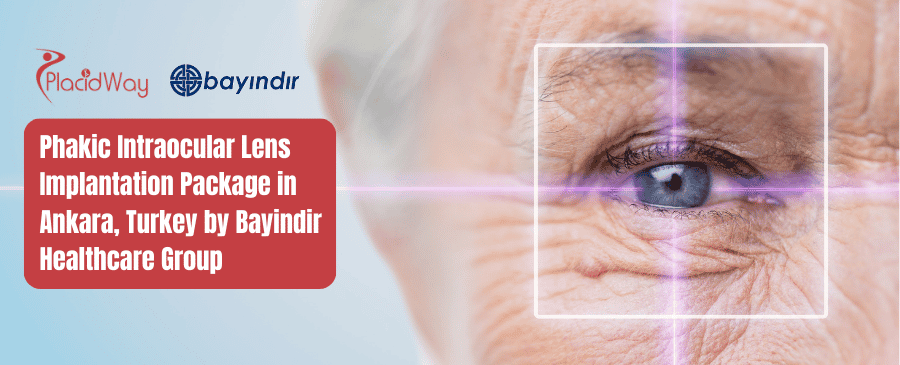
Phaco and IOL Package in Ankara, Turkey by Bayindir Healthcare Group
Transform Your Vision with Lens Implantation in Ankara, Turkey

|
Table of Content • Cost • Inclusions • Exclusions • Benefits • Doctor • Process • FAQs • How to Book |
 Bayindir Healthcare Group, renowned for its excellence in ophthalmic care, offers a comprehensive package for Phakic Intraocular Lens (IOL) implantation in Ankara, Turkey. Phakic IOL implantation is a revolutionary procedure designed to correct refractive errors such as myopia, hyperopia, and astigmatism in individuals who are not suitable candidates for laser eye surgery.
Bayindir Healthcare Group, renowned for its excellence in ophthalmic care, offers a comprehensive package for Phakic Intraocular Lens (IOL) implantation in Ankara, Turkey. Phakic IOL implantation is a revolutionary procedure designed to correct refractive errors such as myopia, hyperopia, and astigmatism in individuals who are not suitable candidates for laser eye surgery.
Bayindir Healthcare Group's team of skilled ophthalmologists utilizes advanced technology and personalized treatment plans to ensure optimal visual outcomes for patients seeking freedom from glasses and contact lenses.
Cost of Phakic Intraocular Lens Implantation in Ankara, Turkey
You can get Phakic Intraocular Lens Implantation Package in Ankara, Turkey by Bayindir Healthcare Group with the price starts at $4,200. Please refer to our price list table below:
|
Location |
Cost in USD |
|
Ankara, Turkey |
$6,000 |
|
United States |
$8,000 |
Note: price may change and vary depends on complexity of procedures and patient conditions. Click free quote button below to learn more:
Top 5 Reasons of Choosing Lens Implantation in Ankara, Turkey
-
Highly Customized Treatment: Bayindir Healthcare Group's ophthalmologists tailor Phakic IOL implantation procedures to meet each patient's unique visual needs and lifestyle preferences, ensuring optimal outcomes and patient satisfaction.
-
Advanced Technology: The use of cutting-edge diagnostic tools and surgical techniques allows for precise measurements and placement of Phakic IOLs, maximizing visual clarity and reducing the risk of complications.
-
Wide Range of Refractive Errors: Phakic IOL implantation can effectively correct a broad spectrum of refractive errors, including high myopia, hyperopia, and astigmatism, providing patients with the opportunity to achieve clear vision without reliance on glasses or contact lenses.
-
Preservation of Corneal Integrity: Unlike LASIK and other corneal refractive surgeries, Phakic IOL implantation preserves the natural structure and integrity of the cornea, making it a suitable option for individuals with thin corneas or irregular corneal shapes.
-
Quick Recovery: Patients undergoing Phakic IOL implantation typically experience minimal discomfort and a rapid recovery period, allowing them to resume normal activities shortly after the procedure with improved vision.
Overview of the Phakic Intraocular Lens Implantation
Phakic IOL implantation is a minimally invasive surgical procedure that involves the implantation of a specialized intraocular lens in front of the eye's natural lens. This lens, known as a Phakic IOL, works in conjunction with the eye's natural lens to correct refractive errors and improve visual acuity. The procedure is performed under local or topical anesthesia to ensure patient comfort, and most patients experience minimal discomfort during the surgery.
For patients with suitable eye structures, specialized premium lenses are frequently used. These include trifocal (for far, intermediate, and near focus), trifocal toric (for far, intermediate, near focus, and correcting astigmatism), EDOF (Extended Depth of Focus lenses for far and intermediate distance correction), and toric (lenses correcting astigmatism) intraocular lenses. The goal is to maximize the patient's independence from glasses after surgery. For this purpose, the latest FDA-approved technology lenses are preferred in surgeries, and the most advanced technological devices (IOL Master 700) are used for lens measurement.
Phakic Intraocular Lens Implantation Package Inclusions
-
Day surgery
-
Pre-op tests
-
Medications
-
Medical disposables
-
Comfortable single-bed room
-
Doctor visits
-
Meals during hospital stay
Phakic Intraocular Lens Implantation Package Exclusions
-
Travel Expenses: Costs associated with transportation, accommodation, and meals during the patient's stay in Ankara for the Phakic IOL implantation procedure are not included in the package.
-
Additional Diagnostic Tests: Any additional diagnostic tests or evaluations required beyond the standard pre-operative assessments may incur additional charges.
-
Complications and Revisions: Costs related to unforeseen complications or the need for revision procedures following Phakic IOL implantation, such as lens exchange or repositioning, may not be covered in the package.
-
Personal Expenses: Expenses for personal items, entertainment, or sightseeing during the patient's stay in Ankara are the responsibility of the patient and are not included in the package.
-
Emergency Services: Any emergency medical services or treatments required beyond the scope of the Phakic IOL implantation procedure may involve additional charges not covered in the package.
Phakic Intraocular Lens Implantation Pre-Op Tests
-
Corneal Topography: Mapping of the corneal surface to assess corneal curvature, thickness, and irregularities, providing valuable information for surgical planning and Phakic IOL selection.
-
Pupil Size Measurement: Evaluation of pupil size and dynamics to ensure proper sizing and positioning of the Phakic IOL for optimal visual outcomes.
-
Intraocular Pressure Measurement: Measurement of intraocular pressure to assess eye health and detect any underlying conditions that may impact surgical candidacy or outcomes.
-
Endothelial Cell Count: Assessment of endothelial cell density in the cornea to evaluate corneal health and determine suitability for Phakic IOL implantation.
-
General Health Assessment: Evaluation of overall health and medical history to identify any factors that may affect surgical eligibility or outcomes and to optimize patient safety during the procedure.
Phakic Intraocular Lens Implantation Surgeon in Ankara, Turkey
 Bayindir Healthcare Group's team of ophthalmologists includes highly skilled and experienced surgeons specializing in refractive and cataract surgery, including Phakic IOL implantation. These dedicated professionals utilize their expertise and advanced surgical techniques to deliver exceptional visual outcomes and ensure patient satisfaction. Patients can trust that their Phakic IOL implantation procedure will be performed by a qualified and experienced surgeon who prioritizes safety, precision, and optimal visual results.
Bayindir Healthcare Group's team of ophthalmologists includes highly skilled and experienced surgeons specializing in refractive and cataract surgery, including Phakic IOL implantation. These dedicated professionals utilize their expertise and advanced surgical techniques to deliver exceptional visual outcomes and ensure patient satisfaction. Patients can trust that their Phakic IOL implantation procedure will be performed by a qualified and experienced surgeon who prioritizes safety, precision, and optimal visual results.
Is Phakic IOL Implantation Right for You?
-
Refractive Error Correction: Phakic IOL implantation is an excellent option for individuals with moderate to severe refractive errors who are not suitable candidates for LASIK or other corneal refractive surgeries.
-
Corneal Integrity: Since Phakic IOL implantation does not involve altering the corneal shape, it is an ideal choice for individuals with thin corneas or irregular corneal surfaces who may not be eligible for laser vision correction procedures.
-
Visual Lifestyle: Patients seeking freedom from glasses or contact lenses and desiring stable and predictable vision correction may benefit from Phakic IOL implantation, which provides excellent visual outcomes and minimal dependence on corrective eyewear.
-
Age Consideration: Phakic IOL implantation is suitable for adults who have reached ocular and physical maturity and have stable refractive errors, making it a viable long-term solution for vision correction.
What to Expect During Phakic IOL Implantation?
-
Pre-Operative Assessment: Patients will undergo a thorough pre-operative evaluation, including measurements of visual acuity, refractive error, corneal topography, and general eye health, to determine candidacy for Phakic IOL implantation.
-
Surgical Procedure: The Phakic IOL implantation surgery is performed by experienced ophthalmic surgeons in a sterile and controlled environment using advanced surgical techniques and equipment to ensure precision and safety.
-
Anesthesia and Comfort: Local or topical anesthesia is administered to ensure patient comfort during the procedure, which typically takes less than an hour to complete.
-
Immediate Visual Improvement: Patients may experience an immediate improvement in visual acuity following Phakic IOL implantation, with optimal results achieved within a few weeks as the eyes heal and adjust to the presence of the implanted lenses.
-
Post-Operative Care: Patients will receive instructions on post-operative care, including the use of prescribed medications, eye drops, and follow-up appointments to monitor healing progress and visual outcomes.
FAQs (Frequently Asked Questions)
Is Phakic IOL implantation suitable for everyone?
Phakic IOL implantation is typically recommended for individuals with moderate to severe refractive errors who are not suitable candidates for LASIK or other laser vision correction procedures. However, candidacy depends on various factors, including ocular health, corneal thickness, and individual visual needs. A thorough evaluation by an ophthalmologist is necessary to determine eligibility for the procedure.
What are the risks associated with Phakic IOL implantation?
While Phakic IOL implantation is generally considered safe and effective, like any surgical procedure, it carries certain risks. Potential risks include infection, inflammation, increased intraocular pressure, and the development of cataracts. However, these risks are rare and can be minimized by choosing a skilled surgeon and following post-operative instructions carefully.
How long does it take to recover from Phakic IOL implantation?
Recovery from Phakic IOL implantation is relatively quick, with most patients experiencing improved vision within a few days to weeks after the procedure. While some mild discomfort or temporary visual disturbances may occur initially, these typically resolve as the eyes heal. Patients are advised to follow their surgeon's instructions regarding post-operative care and activity restrictions to facilitate a smooth recovery process.
Can Phakic IOLs be removed if necessary?
Yes, Phakic IOLs can be removed if necessary, although it is uncommon. In some cases, such as the development of cataracts or other complications, the implanted lens may need to be replaced or removed. Your ophthalmologist can discuss the potential risks and benefits of Phakic IOL removal or exchange based on your individual circumstances.
How long do Phakic IOLs last?
Phakic IOLs are designed to be permanent implants and typically provide stable and predictable vision correction for many years. While the longevity of Phakic IOLs can vary depending on factors such as age, ocular health, and lifestyle, they are intended to provide long-term vision correction without the need for replacement. Regular eye exams and follow-up appointments with your ophthalmologist are recommended to monitor the health and performance of the implanted lenses over time.
Get FREE QUOTE for Lens Implantation in Ankara, Turkey at PlacidWay!
Ready to experience the life-changing benefits of Phakic IOL implantation with Bayindir Healthcare Group in Ankara, Turkey? Schedule your consultation today to learn more about their comprehensive package for refractive vision correction and take the first step towards achieving clear and stable vision without the need for glasses or contact lenses. Contact PlacidWay Medical Tourism to book your appointment and embark on your journey to visual freedom with Bayindir Healthcare Group.








.png)
.png)
